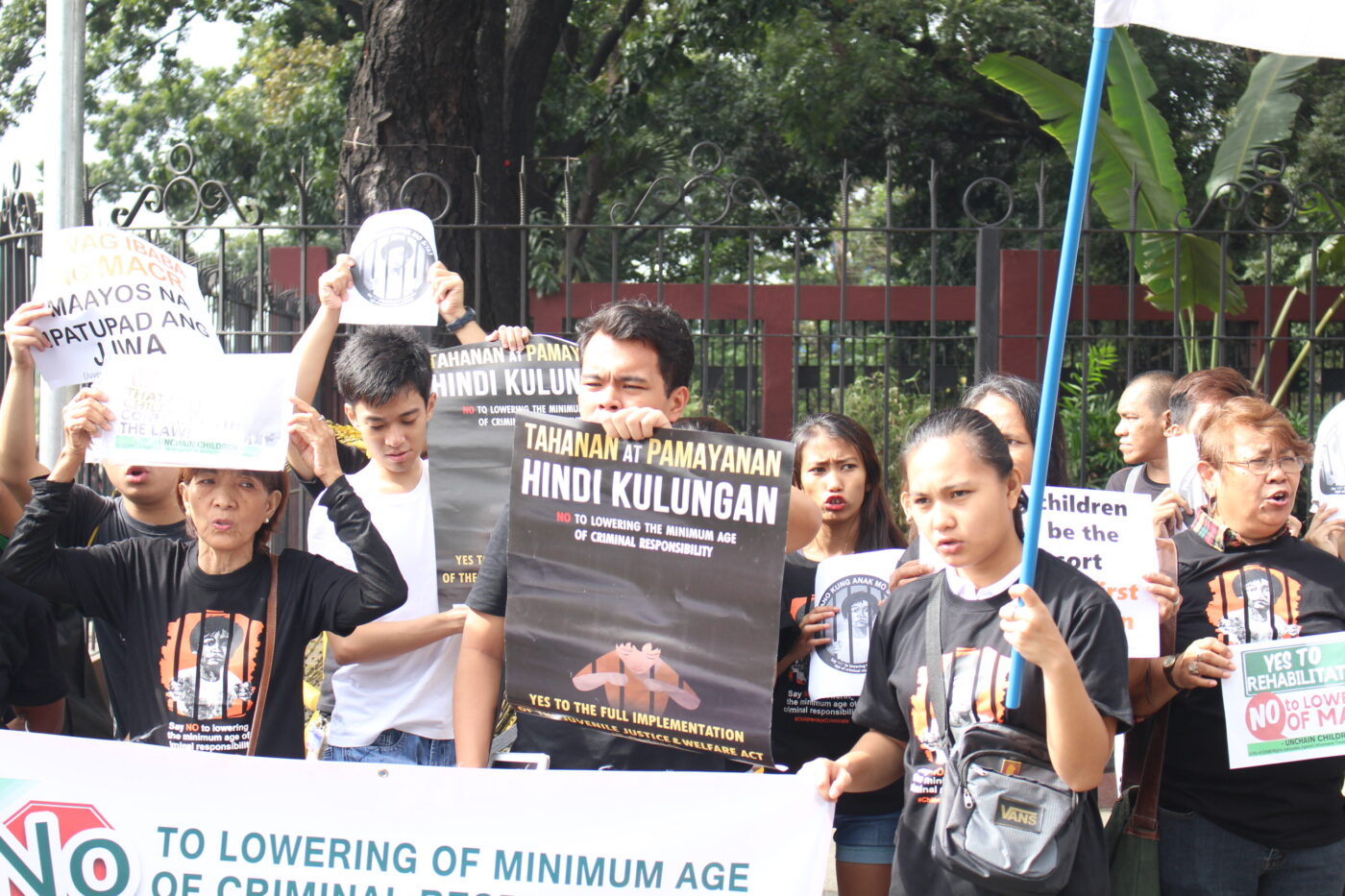PROTESTERS picketed outside of the House of Representatives on January 25 amid a closed-door meeting between members of the House Sub-Committee on Correctional Reforms and the Juvenile Justice and Welfare Council regarding House Bill (HB) 002 that seeks to lower the minimum age of criminal responsibility (MACR).
The bill seeks to lower the MACR from 15 years old to nine years old. House Speaker Pantaleon Alvarez, the bill’s co-author, was expected to attend the meeting.
According to an explanatory note included in the bill, current law on juvenile justice has allowed for the “pampering of youthful offenders” and the use of children by adult criminals to commit crimes.
This was the second bill filed at the opening of the 17th Congress last July. The first, HB 001, is a proposal to reinstate the death penalty.
The protest was organized by members of the Philippine Action for Youth Offenders (PAYO) and Child Rights Network (CRN). Members of different organizations such as Salinlahi Alliance for Children’s Concerns, AKBAYAN Partylist, Simbahang Lingkod ng Bayan, Children Without Borders, and the John J. Carroll Institute on Church and Social Issues were present at the picket.
Urgency of picket
The protesters were prompted to picket because of the expected presence of Alvarez, as well as the closed door-nature of the meeting. Carlo Manano of Salinlahi Alliance for Children’s Concerns worried about the absence of lobbyists like him during the meeting, unlike past committee hearings on the bill.
“House Speaker Pantaleon Alvarez…will be sitting in kaya nangangamba tayo baka may ilang mga maniobrang gawin (House Speaker Pantaleon Alvarez…will be sitting in that’s why we are worried that there could be some sort of manipulation). That is why this action today is important to show that there are people, there are sectors in the society that is opposing ‘yung kanilang proposed action,” said Manano.
Melanie Llana of the John J. Carroll Institute on Church and Social Issues echoed the necessity of that day’s emergency mobilization.
“Ang duda namin, baka magkaroon ng negotiations [sa closed door meeting] regarding that kasi mayroon din ‘yung mga balita na some of the legislators don’t want [to lower the MACR to] nine [years old] but are open to 12. So we don’t know if ‘yun na ba ang magiging panukala ngayon or baka ‘yun na ang magiging part ng committee report nila,” Llana said.
(“We suspect that there will be negotiations [during the closed-door meeting] regarding this because there is news that some of the legislators don’t want [to lower the MACR to] nine [years old] but are open to 12. So we don’t know if this will be the proposal now or maybe this will be part of their committee report.”)
Rep. Tom Villarin of AKBAYAN, who came outside of the House to greet the protesters, encouraged them to lobby different congressmen on the issue.
“’Wag mong madaliin lahat, dapat usapan, at debatehan [ang issue] (Don’t hurry, [the issue] should undergo dialogue as well as debate,” Villarin said.
At the end of the closed-door meeting, the sub-committee decided to convene a technical working group to deliberate the issue further.
“Ang bata sa paaralan, ‘di sa kulungan”
Agnes Gallardo-Quitoriano of Children Without Borders, who was also present at the protest, works with children in prison centers for juveniles. According to her, the bill goes against the basic rights of a child.
“Supposed to be, basic rights ng mga bata ay education, ‘di ba? They can be with their family, and they can be supported in the community. Pero kung ikulong mo siya, ini-isolate mo siya [mula sa komunidad.] (Supposed to be, the basic rights of a child are education. When they are not put in detention, they can be with their families, and they can be supported by the community. When you put them in detention, you isolate the child from the community.),” said Gallardo-Quitoriano.
The bill has also received strong opposition from the Department of Social Welfare and Development, Commission on Human Rights, and other legislators.
As of press time, more than 1,700 have signed CRN and PAYO’s Change.org petition urging Congress and President Rodrigo Duterte to junk the proposal. Meanwhile, an online poll at the House of Representatives’ website had 90% of the more than 21,000 votes cast (as of press time) against the passing of the bill.
Villarin: ‘An outdated standard’
In a memorandum released last Wednesday, University President Jose Ramon Villarin, SJ said that “as an institution tasked in the formation of young people,” the Ateneo “does not support lowering the minimum age of criminal liability.”
“[A]s an institution that takes care of students as young as six years old, we vehemently oppose such a move to criminalize children,” Villarin wrote.
In passing such legislation, Villarin said that “Congress is contemplating returning to an outdated standard” which is rooted in the Revised Penal Code that was passed in 1930.
“Such a retreat would ignore decades worth of research in child and adolescent development, psychology, neurobiology and the social sciences,” he said.
Villarin urged Congress not to change existing laws, which already balance “the needs of justice alongside the equally pressing need to provide an opportunity for a child to develop and grow to become a productive member of society.”
The landmark Juvenile Justice and Welfare Act (Republic Act [RA] 9344) was passed in 2006, setting the MACR at 15 years old. Provisions for the rehabilitation of child offenders were also outlined in the legislation.
Prior to its passage, the United Nations Children’s Fund (UNICEF) estimates that over 50,000 children have been arrested and detained across the country since 1995. UNICEF also says that most of these child offenders commit petty crimes.
RA 10630, which amended parts of the law, were subsequently passed in 2013.
“Let us spend more energy and resources on getting children educated, raised in homes of love and safety, capable of entering the workforce in adulthood,” he said.
As a technical working group has been convened by the House sub-committee to review the bill, Villarin also expressed the Ateneo’s willingness to “work with our legislators in sharing our knowledge based on the research and work that we do with children.




